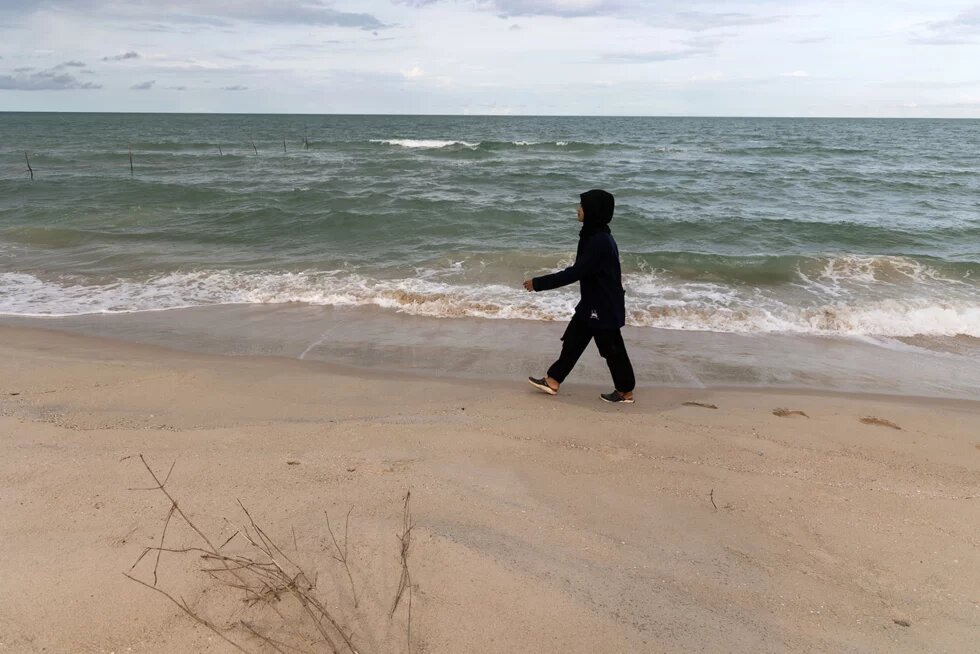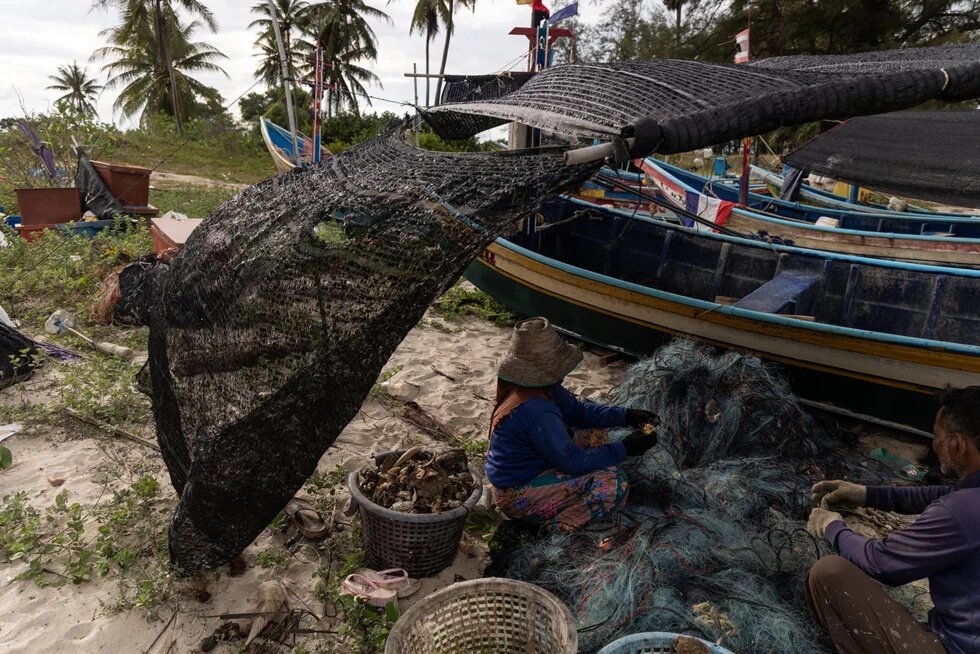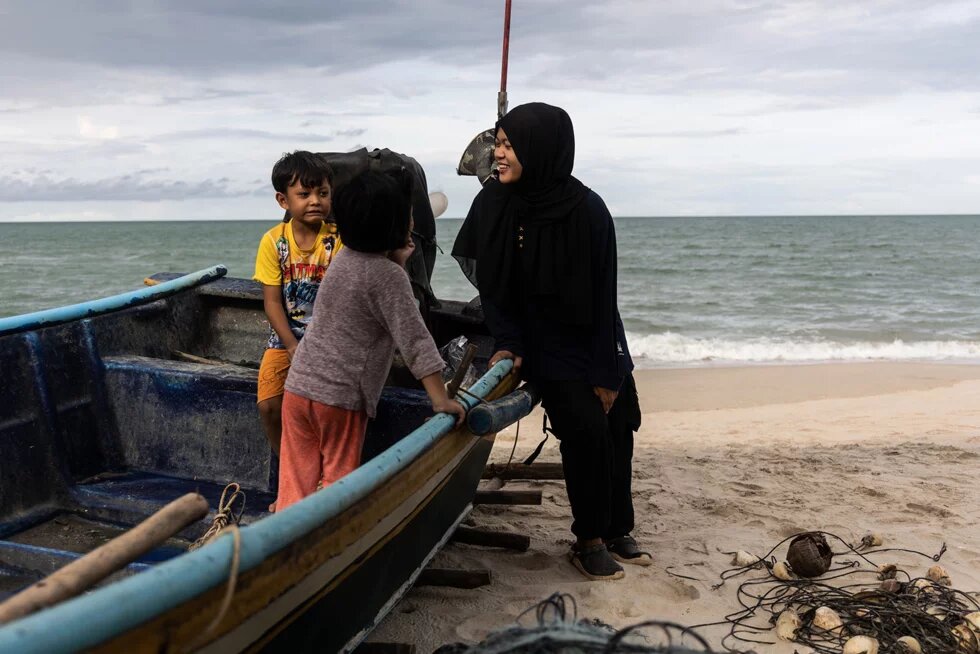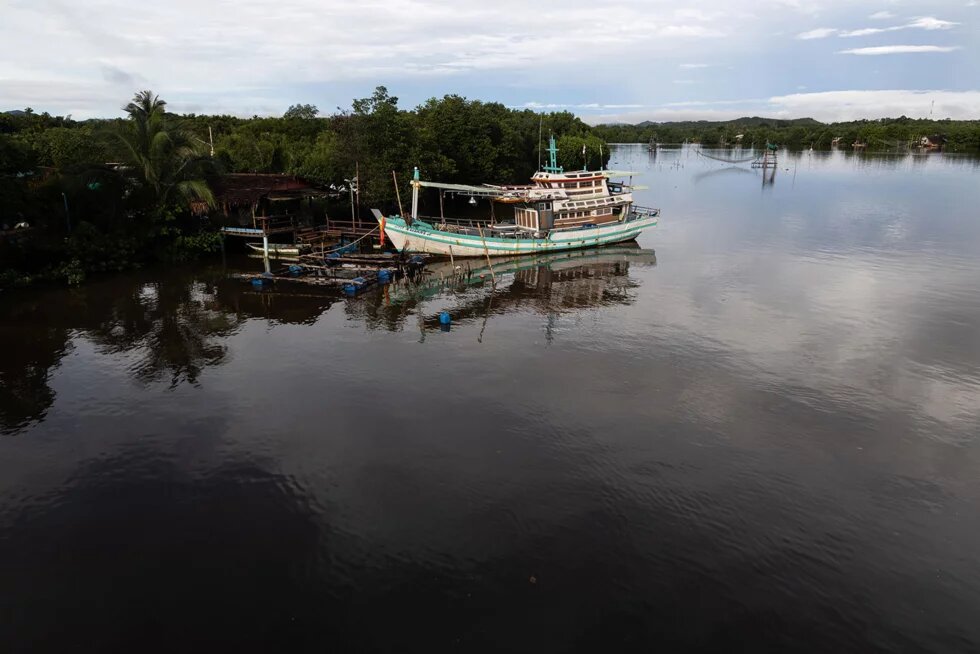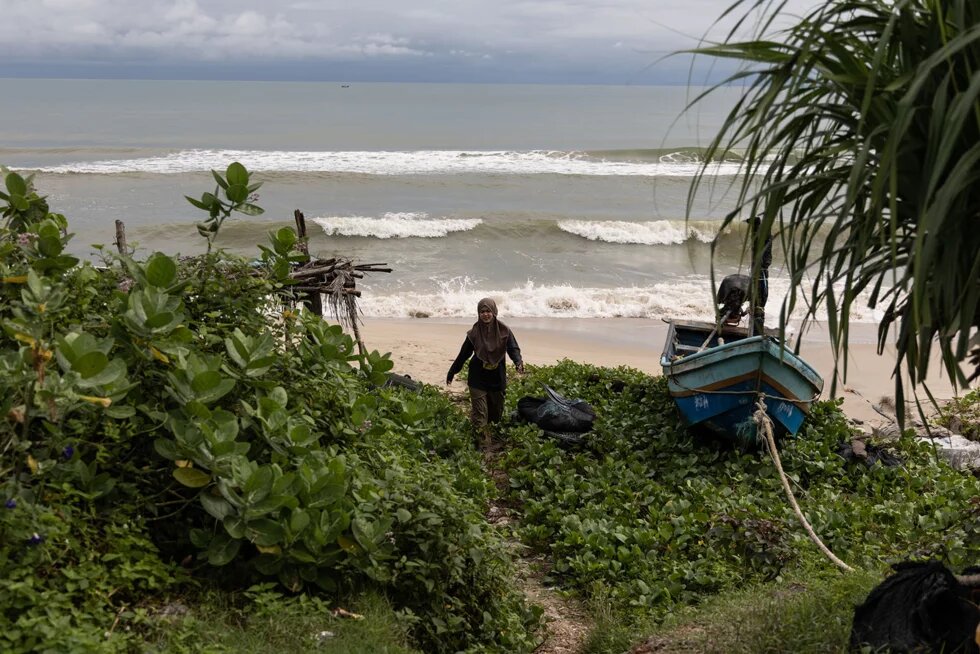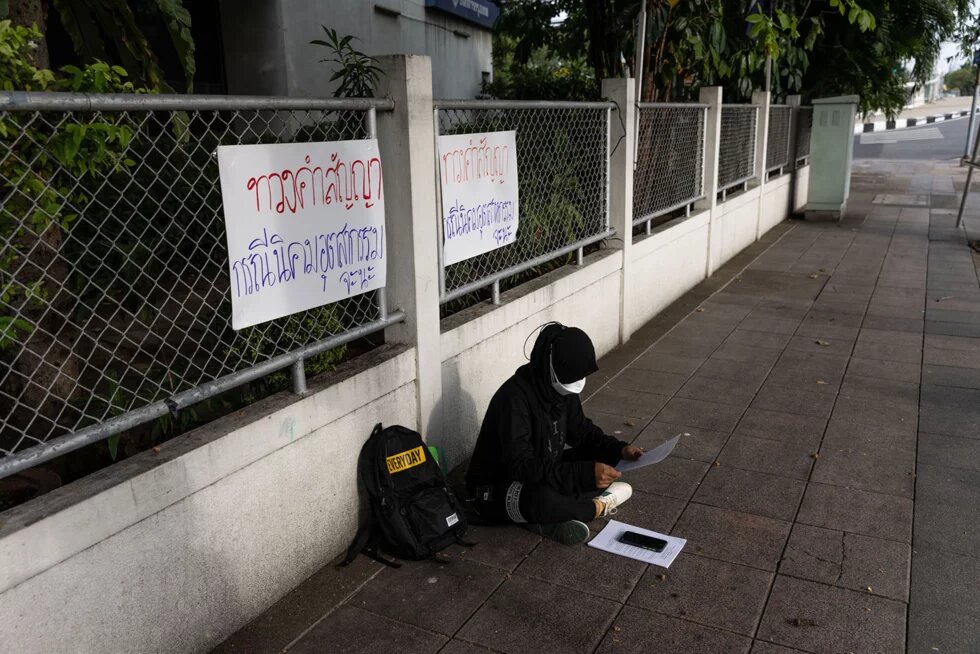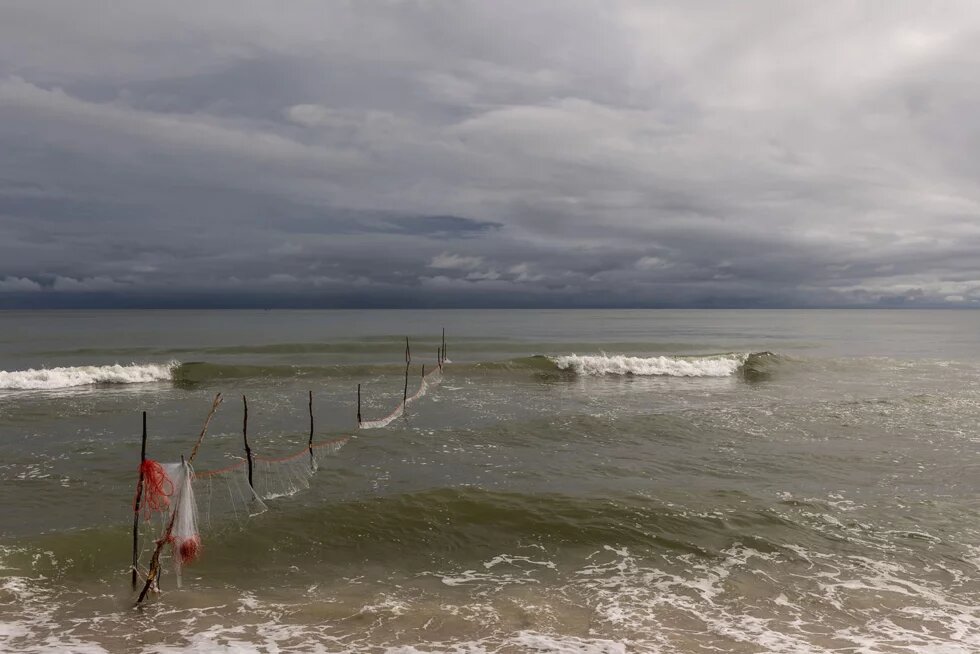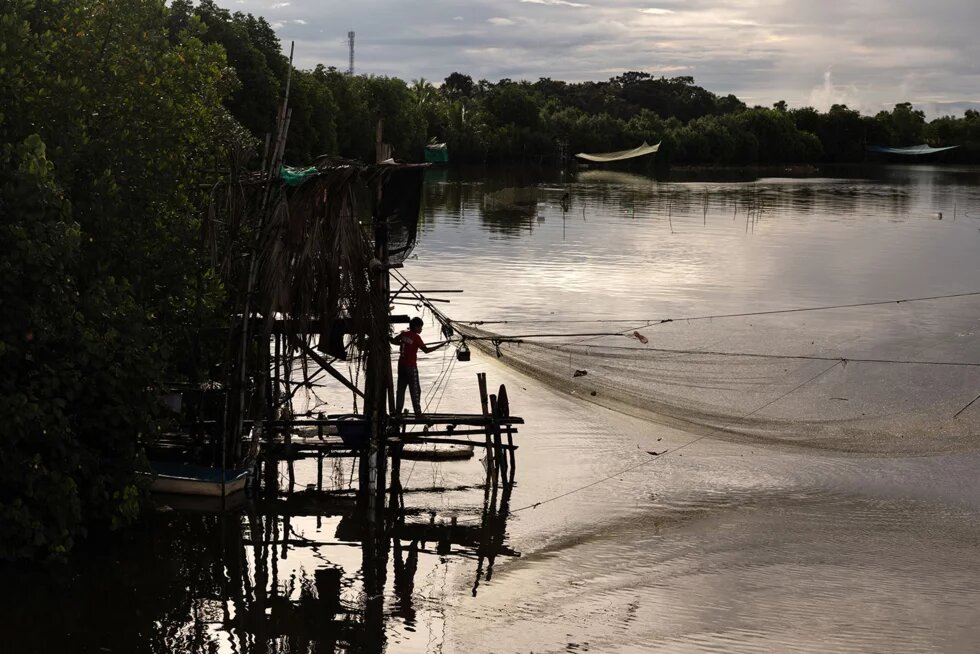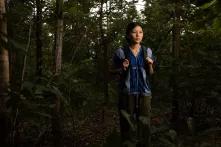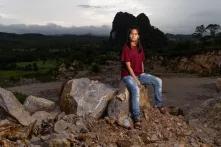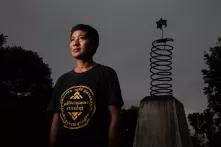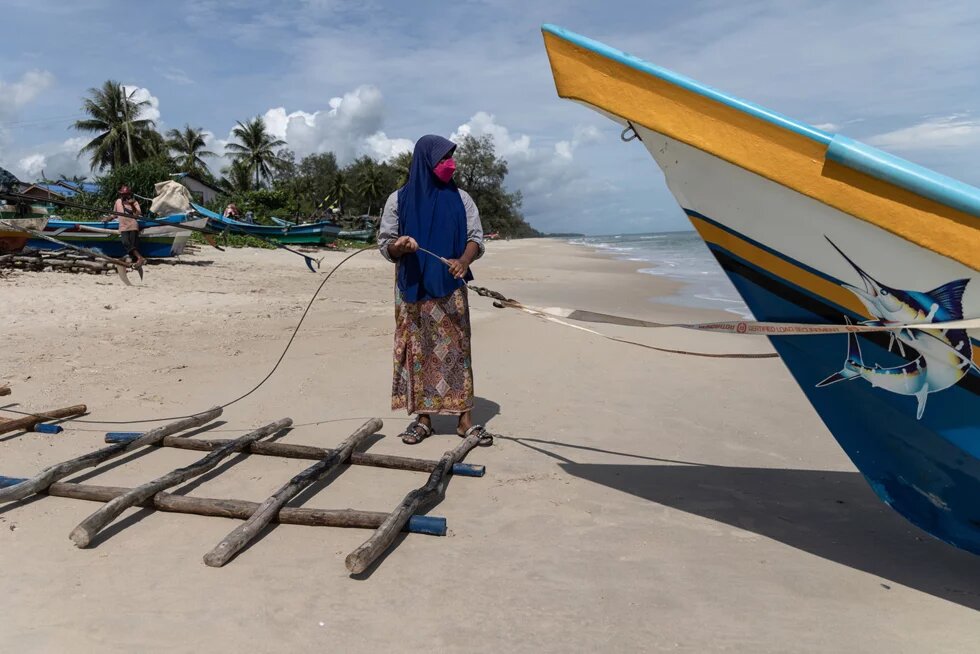
Sitting in front of Songkhla’s city hall, a seaside city in southern Thailand, a young woman dressed in a hijab wrote a letter to the country's prime minister. Choosing each word with care, she called on him "to listen to the stories of the fisherfolk’s children who grew up and bonded with the sea, protected and took care of it." It was in May 2020, two days before a week-long public hearing session for the Chana Industrial Estate project that is poised to transform the quiet fishing villages of Songkhla province into an industrial zone.
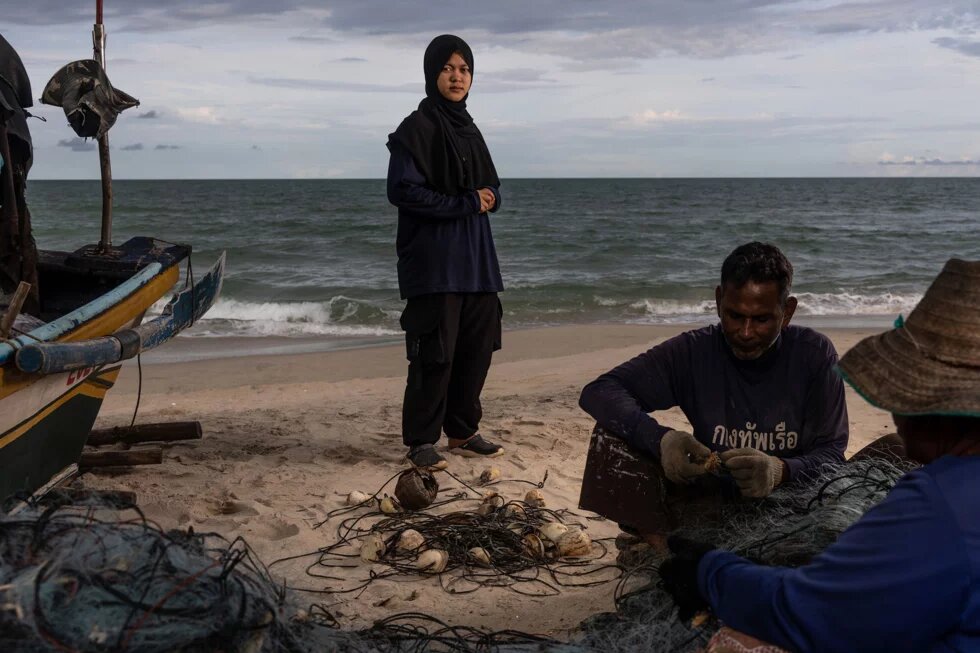
Like many locals, 18-year-old Khairiyah Rahmanyah had only recently learned of the plans through the public hearing announcement. She immediately knew what was at stake for her community, whose livelihoods depend on the sea.
"The house I live in, the clothes that I wear - my shoes, my school uniform, my tuition fees, even the bike and the toys I own, it all comes from the sea," Khairiyah wrote in her letter to Prime Minister Prayuth Chan-ocha. "My whole life of happiness, fond memories, every story that made me who I am, are all from the sea."
She asked to cancel the public hearing arguing that it lacked the involvement of all stakeholders. The hearing was also held during the month of Ramadan and at the height of the COVID-19 pandemic. Eager to receive a response, Khairiyah and her mother camped outside the city hall for 50 hours. Eventually, the authorities responded, announcing to delay the forum for two months.
This unwavering dedication gained Khairiyah the Thai media’s attention, who gave her the nickname "Daughter of the Sea". Overnight, the hashtag #SAVECHANA trended on social media, making Khairiyah’s determination to save the sea she calls home known, and the public hearing to be temporarily delayed.
Daughter of the Sea
Growing up in a small Muslim fishing village at the shores of the Gulf of Thailand, Khairiyah learned to treasure the ocean's abundance from a young age. Both her parents are fisherfolk, with her mom selling the fish that her dad would catch. The sea here feeds families and paces the life of the community.
Observing the fisherfolk’s daily activities and the ever changing nature of the sea, Khairiyah, who goes by the nickname Yah, developed a keen sense of curiosity about the ocean.
"She grew up in a family involved in activism and community service," says Supaporn Malailoy from EnLaw Foundation, an environmental NGO, who has gotten to know Ya over the past year. "She is determined to work for others and not just herself."
Since Yah was a child, her father has been active in environmental activism, working with organisations like the Thai Sea Watch Association and the Coastal Resource Restoration Association.
Tagging along, Yah would quiz her dad about the workings of the ocean, slowly piquing her curiosity about marine ecosystems.
At school, Yah continued to ask questions about the environment and developed a strong passion for protecting the sea. She learned how the ocean's regenerative processes are easily jeopardised by external pollutants, which would only stand to worsen in the face of industrial development and human-induced pollution.
"As I started to travel more, I understood the importance of climate and it reassured me that I was onto something," Yah says. "I became confident that I wasn't just protecting my family or my village, but also I'm part of a bigger movement to buy time for an aging Earth."
Industrialising the shores
In January 2020, the Cabinet approved an 18.7-billion-baht investment plan for a special economic zone in Yah's home district of Chana. The industrial zone would host light and heavy industries such as biomass power plants, petrochemical plants and deep seaports. The project is part of a bigger vision, the "Triangle of Security, Prosperity, and Sustainability" project, to improve the area's economy and reduce the unrest that rocked the region for decades.
Chana is regarded as a conflict-prone area, and is close to the heart of Southern Thailand’s insurgency. Due to the on-going conflicts, the area has been placed under on-and-off emergency decrees since 2005 and is managed by the Southern Border Provinces Administrative Center, a governing body with considerable decision-making powers.
Given the economy in Songkhla and the Deep South are driven by agriculture and fisheries, the industrial estate’s development objective is to provide more manufacturing jobs that could help to increase household incomes and the region's GDP.
However, once the people of Chana learned of the industrial estate at a public hearing in May 2020, the project had already received initial approval. Local villagers therefore questioned whether the event was meant to gather public opinions or officially announce the project's commencement.
For Ya, the industrial development plan posed a threat to the ocean's health and biodiversity that is crucial for sustaining livelihoods in her hometown.
Chana has been a target area for development for many years. Often, projects are approved before environmental impact assessments or proper public hearings have been organised, according to Yah.
"I was born into pain, all the time, because Chana always had issues for many generations," says Yah, referring to previous projects like the Trans Thailand-Malaysia Gas Pipeline that drew large protests in Songkhla in the 2000s.
A cautious victory
After her first success in getting the forum postponed, Yah wrote a second letter to the prime minister last July asking for the voice of villagers to be genuinely heard and evaluated before the construction of the industrial estate project. She travelled to Bangkok to camp outside the prime minister's office.
"The anxiety and nerves only paled in comparison to the fear of not having a home to live in. That's what I was most scared of," Yah says.
Later on, more villagers joined in on the protest against the industrial estate. In December last year, Yah was joined by more community activists. More than 50 villagers travelled to Bangkok, to show their opposition to the industrial project. The majority of them were women who joined on behalf of their families back home.
After staying in the streets of Bangkok for over a week, the villagers returned home after Thammanat Prompow, then deputy minister of agriculture, came to negotiate. The resolution was that the government agreed to carry out a strategic environmental assessment, but refused to cancel the cabinet resolution - meaning that the project is still on the table but delayed for now.
"Now, it's quiet,” says Yah. “But there was also news again of a cabinet resolution for Chana to become a free trade zone to attract investors.”
In late November, Yah travelled from Chana to Bangkok again to sit in front of the Government House and campaign for change. She demanded the government make good on its promise from last December to halt further project developments until the environmental assessment is completed.
Facing challenges
As the media turned their microphones and cameras to Yah, naming her "the Daughter of the Sea", she became the face of the resistance against the industrial estate.
"I'm proud of myself that I was able to make my hometown known," she says. "In the beginning, no matter how loud we tried to convey our message, no one heard it. But today we are successful."
But with the public attention also came threats and surveillance. People followed her and her family whenever they left the house. Concerned about their daughter's safety, Yah's parents often took time off from work to accompany her to places and events.
"Because her parents have been involved in activism before, they were ready to support their daughter," says Supaporn from EnLaw Foundation. "Support and understanding from the family is an essential reinforcing factor that makes young activists more eager to speak out and overcome challenges."
The police once visited Yah at her school, alarming her teachers and classmates.
"My teacher asked me 'are you not scared'," she recalls. "I responded with 'Then bring it on!'. If someone comes out to claim their rights and gets faced with being shot, then let it be known. Let it be known that there's no justice in this country."
Looking Forward
After graduating from high school, Yah enrolled at Pattani University's media innovation program. She hopes that studying media will help her continue telling Chana's story and bring it to an international audience.
"My story has been able to be heard and known because of the media's power," Yah says. "I want to make Chana's story travel as far as possible to reach all kinds of people."
In the future, she hopes to create movies or cartoons reflecting Chana's story and the broader picture of the environment and climate change.
"Even if [my contribution] is small. How many people are in the world? How many people are in Thailand? These small things, once added up, one day, one month, one year, it will be a lot," Yah says.
And uniting is what she hopes to do. As the industrial project is still on the table, awaiting further environmental assessments, Yah continues to stand firmly for the future she envisions for her village. Not only for her community, but a wider audience.
"The story of Chana is not only about the people and communities living in Chana," Yah says. "It generates long-term impacts that influence everyone, be it global warming or climate change. I want everyone to see that Chana's story is everyone's story."
This piece was produced HaRDstories with the support of the Global Support for Democracy Unit of the Heinrich-Böll-Stiftung European Union and is part of the dossier "Young voices on the rise. Youth & democracy in the Asia-Pacific region". Edited by Fabian Drahmoune
The article first appeared here: eu.boell.org
